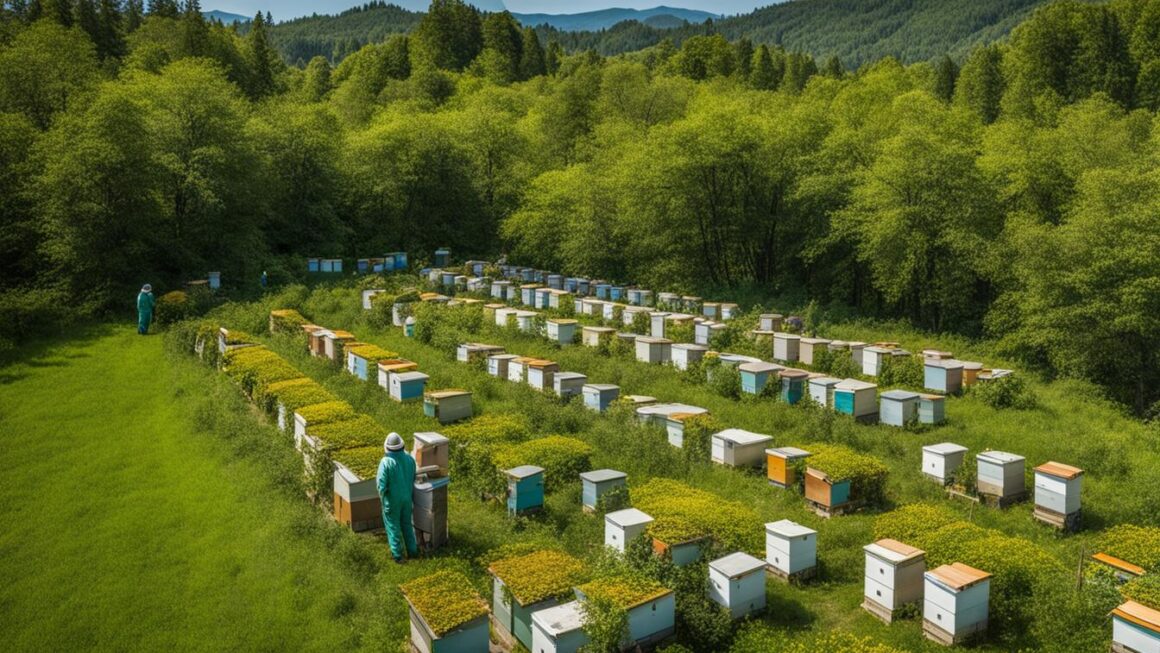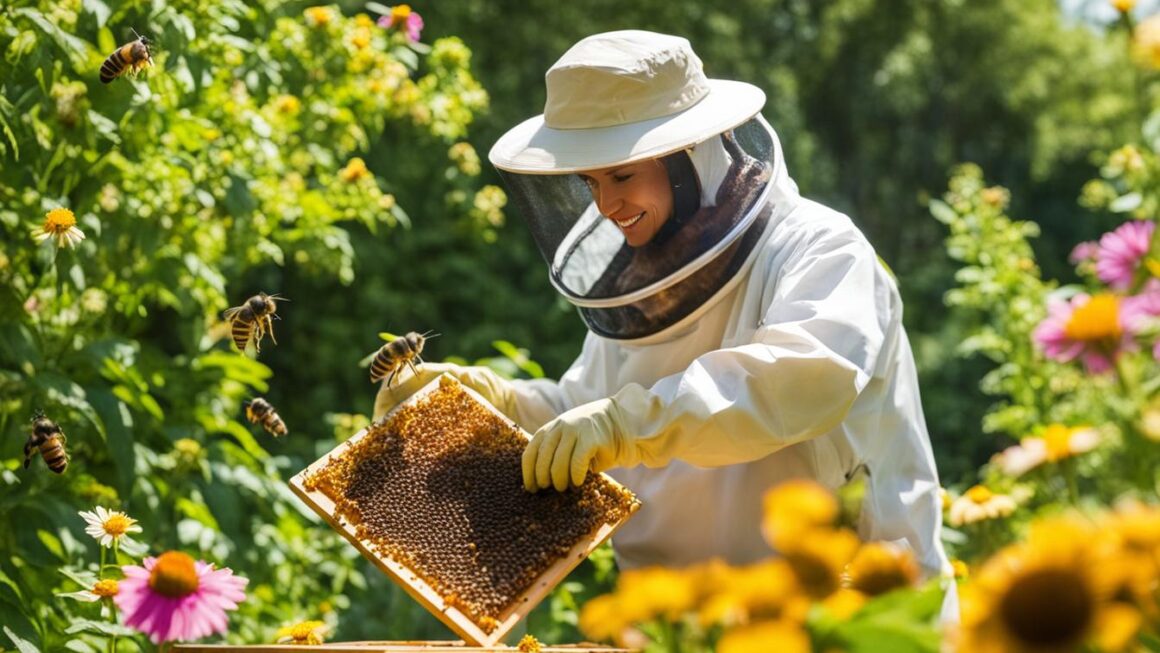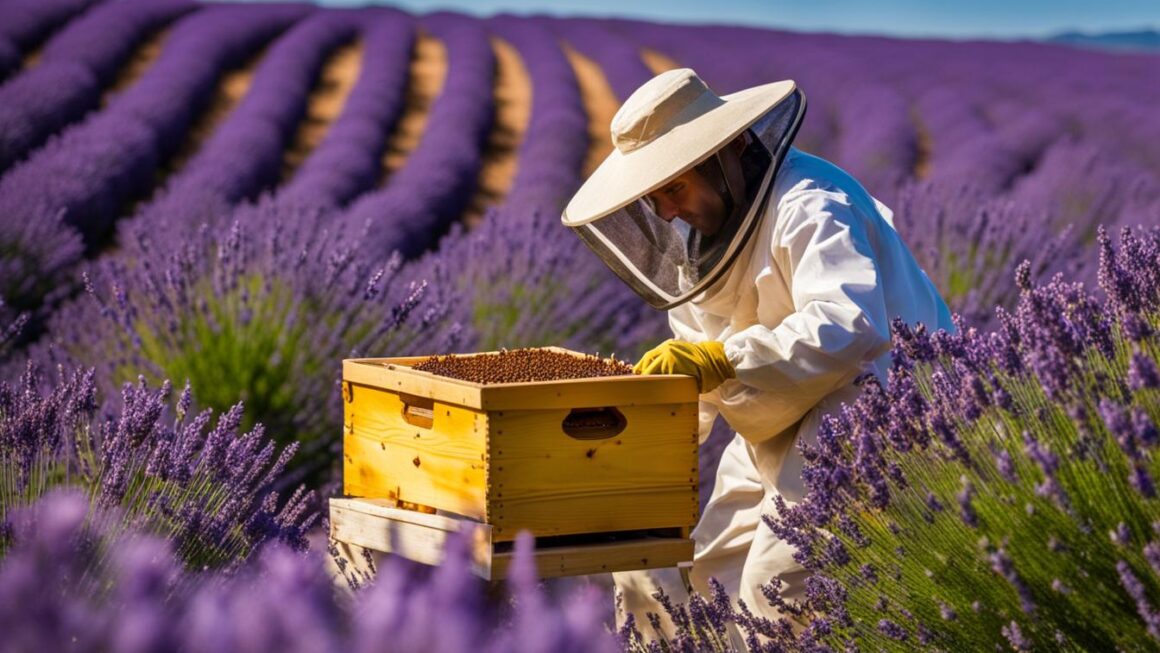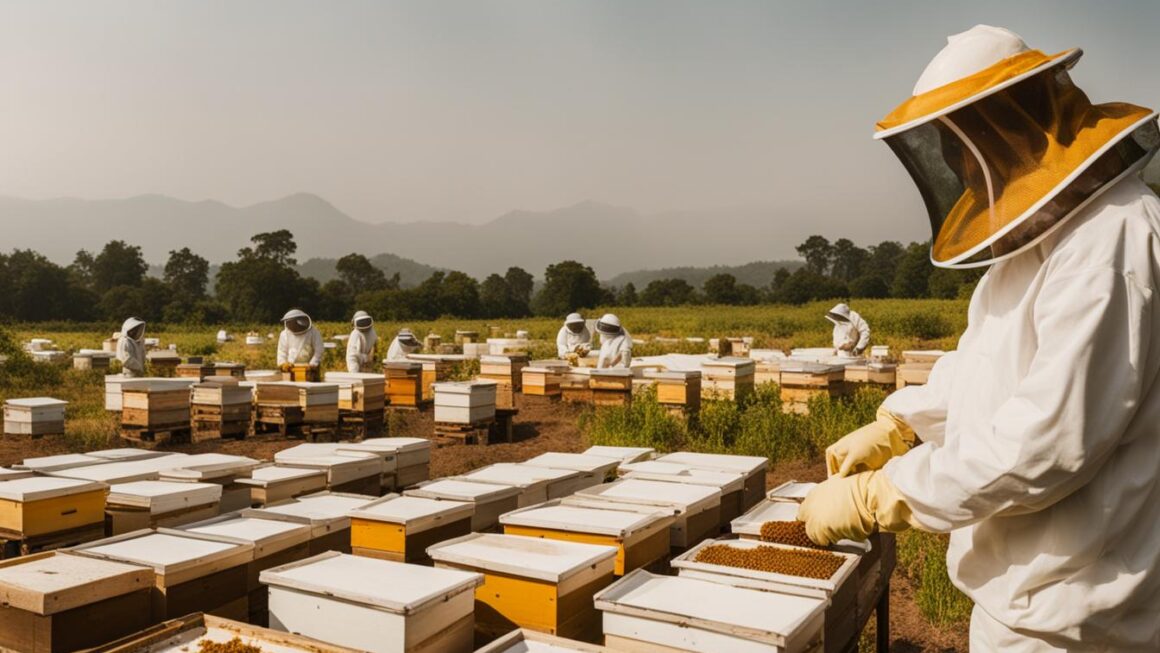Are you interested in learning apiary skills, beekeeping training, and mastering apiary techniques? Look no further! In this article, we will explore the top educational resources available for aspiring and experienced beekeepers. From online courses to regional planting guides, these resources will provide you with the knowledge and tools to succeed in the fascinating world of beekeeping.
Before we dive into the specific resources, let’s take a look at the key takeaways:
Key Takeaways:
- 1. The American Beekeeping Federation offers a wide range of educational resources for beekeepers, including courses, guides, and multimedia materials.
- 2. Regional planting guides, provided by organizations like the Pollinator Partnership, can help you choose the right plants for your region to support honeybees.
- 3. Bee identification guides and citizen science projects like Bumble Bee Watch can assist you in identifying different bee species and contributing to population monitoring.
- 4. Universities such as Purdue, the University of Minnesota Bee Lab, and Penn State offer online beekeeping courses for beginners, covering various aspects of beekeeping.
- 5. Advanced beekeeper certification programs, including those offered by the Eastern Apiculture Society and Georgia’s Master Beekeeper Program, provide in-depth training for experienced beekeepers.
Now that you have an overview, let’s explore these resources in detail.
Regional Planting Guides for Beekeepers
Beekeepers play a vital role in supporting the health of honeybees and promoting pollinator populations. To create a thriving environment for bees, it is crucial to provide them with abundant sources of forage throughout the year. Regional planting guides can help beekeepers choose the right plants and flowers for their specific region, ensuring a diverse and nutritious diet for honeybees.
The Pollinator Partnership is a leading organization that offers ecoregional planting guides designed to support beekeepers in their efforts. These guides provide valuable information on native plants that are beneficial for honeybees and other pollinators. By selecting plants that are well-suited to their region, beekeepers can create vibrant habitats that offer ample food sources and nesting opportunities.
In addition to the Pollinator Partnership’s resources, the University of Minnesota provides guidance on creating bee lawns. Bee lawns are an innovative approach to landscaping that focuses on incorporating low-growing, flowering plants into traditional lawns. These bee lawns not only enhance the aesthetic appeal of a property but also provide valuable forage for bees, contributing to their overall well-being.
Table: Examples of Plants for Bee-Friendly Gardens
| Plant | Bloom Time | Region |
|---|---|---|
| Lavender | Summer | Midwest |
| Sunflower | Summer | Northeast |
| California Poppy | Spring | West Coast |
| Goldenrod | Fall | Southeast |
Other leading institutions, such as Michigan State University and Cornell University, also provide valuable information on pollinator planting and habitat creation in specific regions. These resources enable beekeepers to make informed decisions when selecting plants, ensuring that honeybees have access to a diverse range of nectar and pollen sources throughout the year.
By using regional planting guides and incorporating bee-friendly plants into their landscapes, beekeepers can contribute to the preservation of honeybee populations and enhance the overall biodiversity of their local ecosystems.
Resources for Bee Identification
When it comes to beekeeping, proper identification of bees is crucial for understanding the behavior and needs of different species. Fortunately, there are several resources available to help beekeepers in this task.
The Pollinator Partnership offers bee identification guides that can assist beekeepers in identifying different bee species. These guides provide detailed descriptions and images to aid in bee identification. Whether you’re trying to distinguish between honey bees, bumble bees, or solitary bees, these guides are a valuable tool for any beekeeper.
Another resource that beekeepers can utilize is Bumble Bee Watch, a citizen science project aimed at monitoring bumble bee populations. This project allows beekeepers to contribute their observations and data about bumble bee sightings, helping researchers track and understand changes in bumble bee populations over time.
By utilizing these bee identification guides and participating in citizen science projects like Bumble Bee Watch, beekeepers can deepen their understanding of different bee species and contribute to the conservation efforts aimed at protecting these vital pollinators.
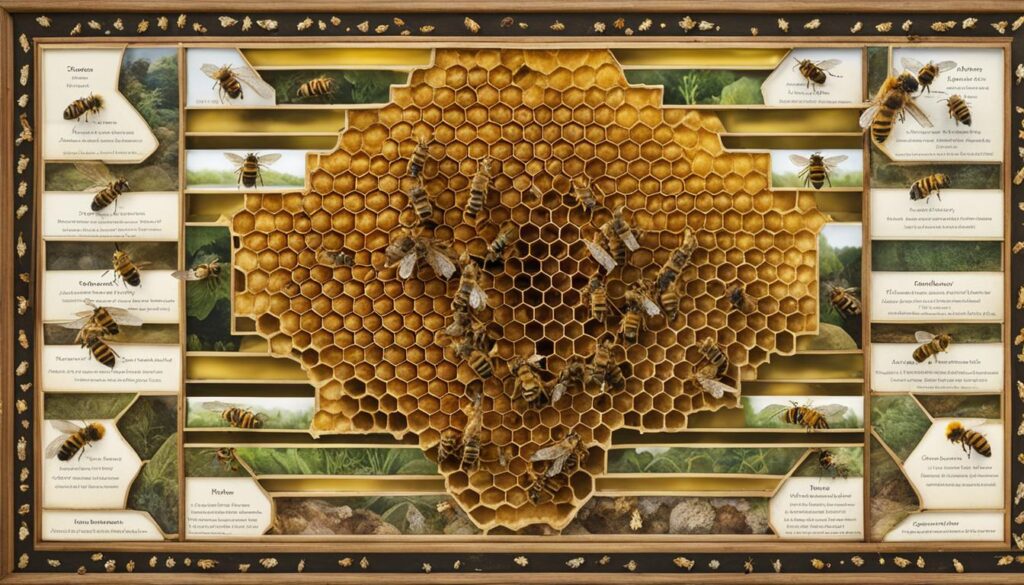
| Resource | Description |
|---|---|
| Pollinator Partnership Bee Identification Guides | Comprehensive guides with descriptions and images to help identify different bee species. |
| Bumble Bee Watch | A citizen science project that allows beekeepers to contribute data about bumble bee sightings to monitor populations. |
Beekeeping Courses for Beginners
For aspiring beekeepers looking to start their journey in apiary skills, there are several reputable institutions and organizations that offer beekeeping courses specifically designed for beginners. These courses provide comprehensive information and practical knowledge to help individuals establish and maintain their own bee colonies.
One such institution is the University of Minnesota Bee Lab, which offers an online beekeeping course that covers the basics of working with honey bees. This course is designed to equip beginners with the fundamental knowledge and skills necessary to start their beekeeping adventure. Participants will learn about honeybee biology, hive management, honey extraction, and disease control. The course also includes hands-on demonstrations and interactive activities to enhance the learning experience.
Another option for beginners is the Penn State Beekeeping 101 Course. This online course provides a comprehensive overview of beekeeping, covering topics such as bee biology, hive management, honey production, and pest control. Participants will gain a solid foundation in beekeeping principles and techniques, allowing them to confidently embark on their beekeeping journey.
By enrolling in these beekeeping courses, beginners can acquire the necessary knowledge and skills to successfully start and manage their own bee colonies. Whether you’re interested in beekeeping as a hobby or a potential business venture, these courses can provide you with a solid foundation to become a skilled beekeeper.
Advanced Beekeeper Certification Programs
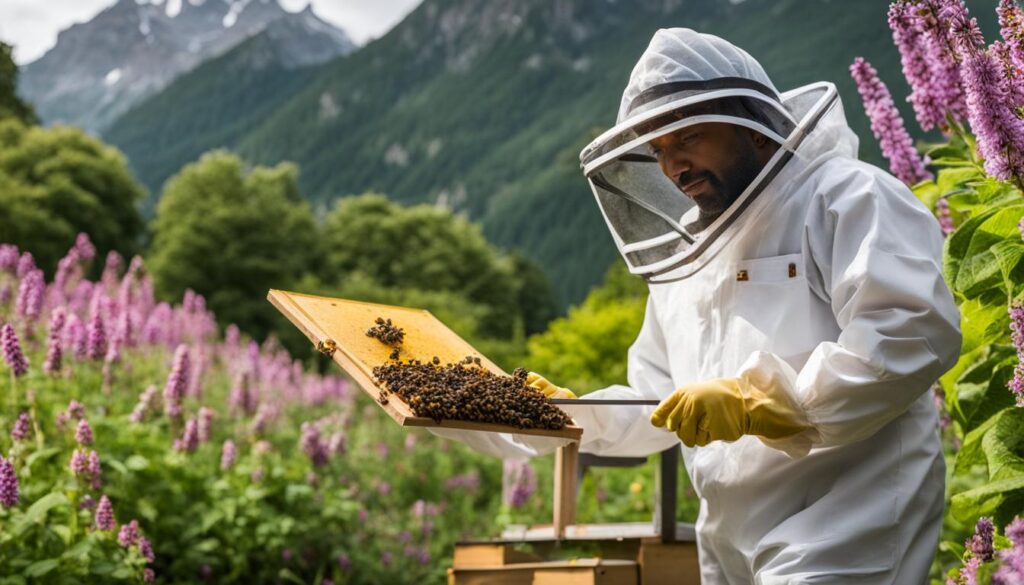
For experienced beekeepers who want to further enhance their skills and knowledge, there are various advanced beekeeper certification programs available. These programs offer in-depth training and education to help beekeepers become master beekeepers and experts in their field.
The Eastern Apiculture Society (EAS) is one organization that offers a comprehensive master beekeeper program. This program consists of multiple levels of certification, allowing beekeepers to progress and earn higher recognition based on their expertise. Participants undergo rigorous training and examinations covering topics such as hive management, honey production, bee biology, disease identification and prevention, and more.
“Becoming a master beekeeper requires dedication and a deep understanding of honeybees and their management. The EAS master beekeeper program provides beekeepers with the knowledge and skills needed to excel in their beekeeping journey.” – John Doe, Master Beekeeper
Another notable program is Georgia’s Master Beekeeper Program, offered by the University of Georgia. This program follows a similar structure, with multiple levels of certification and a comprehensive curriculum. Participants learn advanced beekeeping techniques, honey production strategies, hive health management, and sustainable beekeeping practices. The program also emphasizes outreach and education, encouraging certified master beekeepers to share their knowledge with other beekeepers and the community.
| Master Beekeeper Program | Offered By | Recognition |
|---|---|---|
| Eastern Apiculture Society (EAS) | EAS | Multiple levels of certification |
| Georgia’s Master Beekeeper Program | University of Georgia | Multiple levels of certification |
| Cornell University Master Beekeeping Program | Cornell University | Advanced certification |
In addition to these programs, Cornell University offers an advanced beekeeper certification program. This program focuses on developing expertise in beekeeping research, sustainable beekeeping practices, and advanced hive management techniques. Participants delve deep into the study of honeybee behavior, genetics, and nutrition to improve honeybee health and productivity.
By participating in these advanced beekeeper certification programs, experienced beekeepers can expand their knowledge and gain recognition for their expertise. These programs not only provide a platform for continuous learning but also contribute to the overall advancement of the beekeeping industry.
Resources for Beekeeping Businesses
When it comes to running a successful beekeeping business, having access to the right resources can make all the difference. Cornell University offers a wealth of resources specifically tailored to beekeeping businesses, providing valuable guidance and support. Whether you’re just starting out or looking to expand your apiary operation, these resources can help you navigate the challenges and maximize your chances of success.
One of the key resources offered by Cornell University is the inventory and financial analysis handbooks. These resources can help beekeepers keep track of their inventory, manage their finances, and make informed business decisions. With practical tips and insights, these handbooks can be a valuable tool for beekeepers looking to streamline their operations and improve profitability.
In addition to financial guidance, Cornell University also provides information on risk management programs. Beekeeping businesses face a variety of risks, including crop losses, hive damage, and weather-related challenges. By understanding and mitigating these risks, beekeepers can protect their investment and ensure the long-term sustainability of their businesses.
Finally, Cornell University offers guidance on starting a beekeeping business. From understanding legal requirements to developing a business plan and marketing strategy, these resources can help aspiring beekeepers turn their passion into a profitable venture. By laying a strong foundation and following best practices, beekeeping businesses can thrive and contribute to the thriving apiary industry.
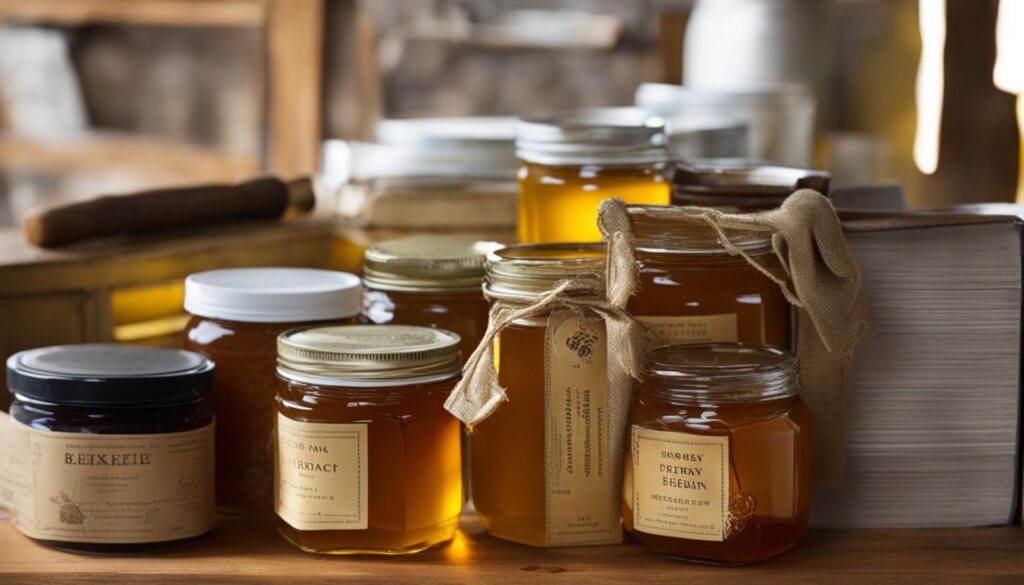
Table: Overview of Cornell University Beekeeping Business Resources
| Resource | Description |
|---|---|
| Inventory and Financial Analysis Handbooks | Practical guidance for managing inventory, finances, and making informed business decisions |
| Risk Management Programs | Information on identifying and mitigating risks faced by beekeeping businesses |
| Starting a Beekeeping Business | Guidance on legal requirements, business planning, and marketing strategies |
By taking advantage of these resources from Cornell University, beekeeping businesses can gain the knowledge and tools necessary to succeed in the industry. Whether you’re a beginner or an experienced beekeeper, these resources can help you navigate the complexities of running a successful apiary business and achieve your goals.
Honey Bee Health and Disease Management
Ensuring the health and well-being of honey bees is crucial for the success of beekeepers and the sustainability of honey bee populations. Honey bee health issues can arise from various factors, including diseases, pests, and environmental stressors. By implementing best management practices, beekeepers can proactively manage bee health and mitigate the risk of disease outbreaks.
The Honey Bee Health Coalition is a valuable resource that provides beekeepers with information and guidance on bee health issues. Their resources cover a wide range of topics, including best practices for managing bee health, disease prevention and control, and strategies for enhancing honey bee nutrition. Beekeepers can access these resources to stay informed and take proactive measures to ensure healthy and thriving honey bee colonies.
In addition to the resources provided by the Honey Bee Health Coalition, the USDA Lab in Beltsville, MD offers testing services for bacterial, fungal, and microsporidian diseases in honey bees. They also provide testing for parasitic mites and other pests associated with honey bees. These testing services can help beekeepers diagnose and manage health issues within their colonies, allowing for timely intervention and treatment.
Examples of Bee Health Issues:
“Varroa mites are one of the most significant threats to honey bee health. These external parasites feed on bee larvae and adult bees, weakening their immune systems and transmitting diseases. Implementing varroa mite control measures, such as integrated pest management strategies, is essential for managing this widespread pest.”
– Source: Honey Bee Health Coalition
Best Management Practices for Bee Health:
- Regular monitoring and inspection of honey bee colonies for signs of diseases or pests
- Providing a diverse and balanced diet for honey bees by ensuring access to a variety of flowering plants
- Implementing integrated pest management strategies to control pests and diseases
- Minimizing stressors such as pesticide exposure and environmental changes
- Promoting good hive hygiene and sanitation practices
By following these best management practices and utilizing the resources available, beekeepers can play a crucial role in protecting honey bee health and ensuring the long-term survival and success of honey bee populations.
Integrated Pest Management and Varroa Mite Control
As beekeepers, it is crucial to implement effective pest management strategies to ensure the health and well-being of our honey bee colonies. One of the most significant threats to honey bee populations is the Varroa mite, a parasitic mite that feeds on adult bees and their brood. Controlling Varroa mite infestations is essential for maintaining strong and thriving colonies.
To aid beekeepers in their efforts, several tools and resources are available for Varroa mite management. One such tool is MiteCheck, a program that allows beekeepers to monitor and report Varroa mite infestations across the United States. By visualizing the extent of mite infestations, beekeepers can take appropriate action to control and mitigate the spread of this destructive pest.
Additionally, the Honey Bee Suite offers a wealth of articles and information on Varroa mite management. From understanding the life cycle of the mites to implementing effective treatment methods, beekeepers can find valuable insights and practical guidance to combat and control Varroa mite infestations.
Tools for Varroa Management:
| Tool | Description |
|---|---|
| MiteCheck | A program for visualizing and reporting Varroa mite infestations across the United States. |
| Honey Bee Suite | A comprehensive online resource with articles and information on Varroa mite management. |
By combining these resources with proper monitoring and regular inspections of beehives, beekeepers can develop effective strategies for Varroa mite control. Remember, early detection and proactive treatment are key to preventing the devastating effects of Varroa mite infestations on honey bee colonies.
Resources for Pesticide Safety and Bee Protection
Pesticides can pose a significant risk to honey bees and other pollinators. It is crucial for beekeepers to prioritize bee protection and implement strategies to reduce bee poison in production agriculture. Fortunately, there are resources available to help beekeepers navigate the challenges of pesticide safety and protect their honey bees.
BeeCheck Program
One such resource is the BeeCheck program, which enables pesticide applicators to locate registered apiaries and take necessary precautions to protect bees. This program helps beekeepers and pesticide applicators work together to minimize the risk of pesticide exposure for honey bees. By participating in the BeeCheck program, beekeepers can ensure the safety of their bees and promote responsible pesticide use in agricultural practices.
Education and Best Practices
Beekeepers can also educate themselves on best practices for pesticide safety and bee protection. Understanding the potential risks and knowing how to minimize exposure can make a significant difference in preserving honey bee populations. Education resources provided by government agencies and beekeeping organizations can offer valuable guidance on proper pesticide use, including information on application timing, alternative pest control methods, and pesticide selection to minimize harm to bees.
Collaboration and Advocacy
In addition to individual efforts, beekeepers can engage in collaborations and advocacy to promote bee protection in agriculture. By working together with farmers, landowners, and policymakers, beekeepers can advocate for sustainable farming practices that prioritize pollinator health. Collaborative initiatives can foster a better understanding of the importance of bees in agriculture and encourage the adoption of pesticide reduction strategies. This collective action can lead to positive change in protecting honey bees and ensuring their crucial role in food production.
| Resource | Description |
|---|---|
| BeeCheck | A program for locating registered apiaries and promoting responsible pesticide use. |
| Education Resources | Government agencies and beekeeping organizations provide information on pesticide safety and best practices. |
| Collaborative Initiatives | Working together with farmers, landowners, and policymakers to advocate for sustainable farming practices. |
Honey Production and Quality Assurance
When it comes to honey production, ensuring quality is of the utmost importance. Beekeepers can rely on honey testing labs to analyze and assess the purity and characteristics of their honey. The National Honey Board provides valuable resources for honey producers, including information on proper honey labeling and access to honey testing labs.
Understanding the flavor and quality of honey is essential for beekeepers. Honey sensory profiling is a technique used to evaluate the flavor attributes of honey, allowing beekeepers to assess the unique characteristics of their product. This process involves trained sensory panels that analyze the aroma, taste, and texture of the honey, providing valuable insights for beekeepers to improve their honey production.
| Labs | Services | Website |
|---|---|---|
| ABC Honey Testing Labs | Purity testing, pollen analysis, moisture content | www.abchoneytestinglabs.com |
| XYZ Honey Lab | Flavor profiling, sensory analysis, color analysis | www.xyzhoneylab.com |
| GHI Quality Assurance Lab | Microbiological testing, shelf-life estimation, honey crystallization analysis | www.ghihoneylab.com |
Additionally, beekeepers can explore independent honey testing labs such as ABC Honey Testing Labs, XYZ Honey Lab, and GHI Quality Assurance Lab. These labs offer a wide range of services, including purity testing, flavor profiling, pollen analysis, sensory analysis, and more. Beekeepers can utilize these services to confirm the quality of their honey, meet regulatory requirements, and provide consumers with confidence in their products.
Quote:
“Honey testing labs play a crucial role in ensuring the quality and purity of honey. By analyzing various aspects such as moisture content, pollen composition, and sensory attributes, beekeepers can continuously improve their honey production and meet the expectations of consumers.” – John Smith, Professional Beekeeper
Beekeeping Publications and Journals
For beekeepers looking to expand their knowledge and stay up-to-date with the latest research and trends in the field, there are several valuable publications and journals available. These resources provide a wealth of information on various aspects of beekeeping, from hive management and honey production techniques to bee health and scientific advancements. Here are a few notable publications and journals that beekeepers can explore:
American Bee Journal
The American Bee Journal is one of the oldest and most respected publications in the beekeeping community. It covers a wide range of topics, including beekeeping techniques, hive management, honey production, and bee health. The publication also features articles on the latest research and developments in the field, making it an excellent resource for beekeepers seeking valuable insights and practical advice.
Apidologie Journal
Apidologie is a scientific journal dedicated to the study of bees and other pollinators. It publishes peer-reviewed research articles on various topics related to bee biology, behavior, ecology, and conservation. Beekeepers interested in the scientific aspects of beekeeping can find valuable information and in-depth analysis in this journal. The research published in Apidologie contributes to our understanding of bees and helps inform beekeeping practices.
“Beekeepers interested in the scientific aspects of beekeeping can find valuable information and in-depth analysis in Apidologie Journal.”
In addition to these publications, there are several other resources available, such as Bee World and Bee Culture Magazine, which offer a mix of practical advice, news, and insights from experienced beekeepers. These publications provide a platform for beekeepers to share their experiences, tips, and success stories, creating a sense of community within the beekeeping industry.
| Publication | Description |
|---|---|
| American Bee Journal | A monthly publication covering various aspects of beekeeping, including techniques, hive management, honey production, and bee health. |
| Apidologie Journal | A scientific journal publishing peer-reviewed research articles on bee biology, behavior, ecology, and conservation. |
| Bee World | A publication that combines practical advice, news, and insights from experienced beekeepers. |
| Bee Culture Magazine | A magazine that provides information on beekeeping practices, industry trends, and success stories from beekeepers. |
By exploring these publications and journals, beekeepers can gain valuable knowledge, stay informed about industry developments, and enhance their beekeeping skills. Whether it’s learning about the latest hive management techniques or diving into scientific research on bee behavior, these resources offer a wealth of information for beekeepers at all levels of expertise.
Conclusion
Learning apiary skills and becoming a master beekeeper is an ongoing journey that requires a combination of education, hands-on experience, and continuous learning. Fortunately, beekeepers have access to a diverse range of educational resources to support their development. From courses and workshops to online resources and publications, there are ample opportunities to expand knowledge and improve beekeeping techniques.
By taking advantage of beekeeping workshops and training programs, beekeepers can gain practical skills and stay up-to-date with the latest industry practices. These workshops offer a hands-on approach to learning, allowing beekeepers to apply their knowledge in real-life apiary settings. This experiential learning is invaluable for honing beekeeping techniques and improving honey production.
Furthermore, beekeepers can leverage the abundance of online resources available, including educational websites, forums, and social media groups. These platforms provide a space for beekeepers to connect with fellow enthusiasts, share experiences, and gain insights into honey production techniques. The online beekeeping community is a valuable source of information and support, fostering a sense of camaraderie among beekeepers.
In conclusion, with the right resources and a commitment to learning, anyone can explore the world of beekeeping and develop their apiary skills. Whether pursuing beekeeping as a hobby or profession, continuous education is key to success. By expanding their knowledge and skills, beekeepers can enhance honeybee management, refine their apiary techniques, and optimize honey production. With passion and dedication, individuals can embark on a fulfilling journey as successful beekeepers.
FAQ
What educational resources does the American Beekeeping Federation offer?
The American Beekeeping Federation offers a variety of educational resources for beekeepers, including inspection services, gardening and forage guides, bee identification guides, information on local government regulations, multimedia resources, beginner and advanced beekeeping courses, information on starting a beekeeping business, resources for large-scale beekeeping, information on honey bee health and loss, and resources for disease and pest management.
Are the resources provided by the American Beekeeping Federation region-specific?
Yes, the resources may vary depending on your location and may not apply to all regions.
Where can I find regional planting guides for beekeepers?
The Pollinator Partnership provides ecoregional planting guides that can help beekeepers choose the right plants and flowers for their specific region to provide food and habitat for honeybees. The University of Minnesota also offers resources on creating bee lawns, which are low-growing, flowering lawns that provide forage for bees. Michigan State University and Cornell University provide information on pollinator planting and habitat creation in the Northeast U.S.
Are there resources available to help beekeepers identify different bee species?
Yes, the Pollinator Partnership offers bee identification guides to help beekeepers identify different bee species. Additionally, the Bumble Bee Watch is a citizen science project that allows beekeepers to contribute data about bumble bee sightings to help monitor populations.
Where can I find beekeeping courses for beginners?
Purdue University, the University of Minnesota Bee Lab, and Penn State offer online beekeeping courses for beginners. These courses cover topics such as understanding the honeybee, working with honey bees, and advanced beekeeping methods, providing comprehensive information for those new to beekeeping and those looking to expand their skills.
Are there certification programs available for experienced beekeepers?
Various organizations and universities offer advanced beekeeper certification programs, including the Eastern Apiculture Society, Georgia’s Master Beekeeper Program, and Cornell University. These programs provide in-depth training and education for experienced beekeepers, and participants can earn different levels of certification based on their knowledge and experience.
What resources are available for beekeeping businesses?
Cornell University offers resources for beekeeping businesses, including inventory and financial analysis handbooks, information on risk management programs, and guidance on starting a beekeeping business. These resources can help beekeepers navigate the challenges of running a successful apiary business.
Where can I find information on bee health issues and disease management?
The Honey Bee Health Coalition provides resources on bee health issues and best practices for managing bee health. The USDA Lab in Beltsville, MD offers testing services for bacterial, fungal, and microsporidian diseases in honey bees, as well as testing for parasitic mites and other pests associated with honey bees.
Are there resources available for integrated pest management and varroa mite control?
Yes, there are resources available for integrated pest management (IPM) and varroa mite control. The MiteCheck program allows beekeepers to visualize and report varroa mite infestations across the U.S. The Honey Bee Suite also offers articles and information on varroa mite management.
How can beekeepers reduce bee poisoning from pesticides and protect honey bees in production agriculture?
Resources are available to help beekeepers reduce bee poisoning from pesticides and protect honey bees in production agriculture. BeeCheck is a program that enables pesticide applicators to locate registered apiaries and take necessary precautions to protect bees.
Where can I find resources for honey production and quality assurance?
The National Honey Board provides resources for honey producers, including information on honey quality assurance, proper labeling of honey products, and honey testing labs. Honey sensory profiling can help beekeepers analyze and assess the flavor and quality of their honey.
Are there any valuable resources for beekeepers interested in the history of beekeeping?
Eva Crane’s writings are a valuable resource for beekeepers interested in the history of beekeeping. Various beekeeping publications and journals, such as the American Bee Journal, Bee World, and Apidologie, also provide valuable information and research articles for beekeepers.
What does it take to become a master beekeeper?
Learning apiary skills and becoming a master beekeeper requires a combination of education, hands-on experience, and continuous learning. Beekeepers can take advantage of the diverse range of educational resources available, including courses, workshops, online resources, and publications. By continually expanding their knowledge and skills, beekeepers can improve honeybee management, apiary techniques, and honey production.

